Thomas James Richards, Diaries, Transcript Vol. 2 - Part 29
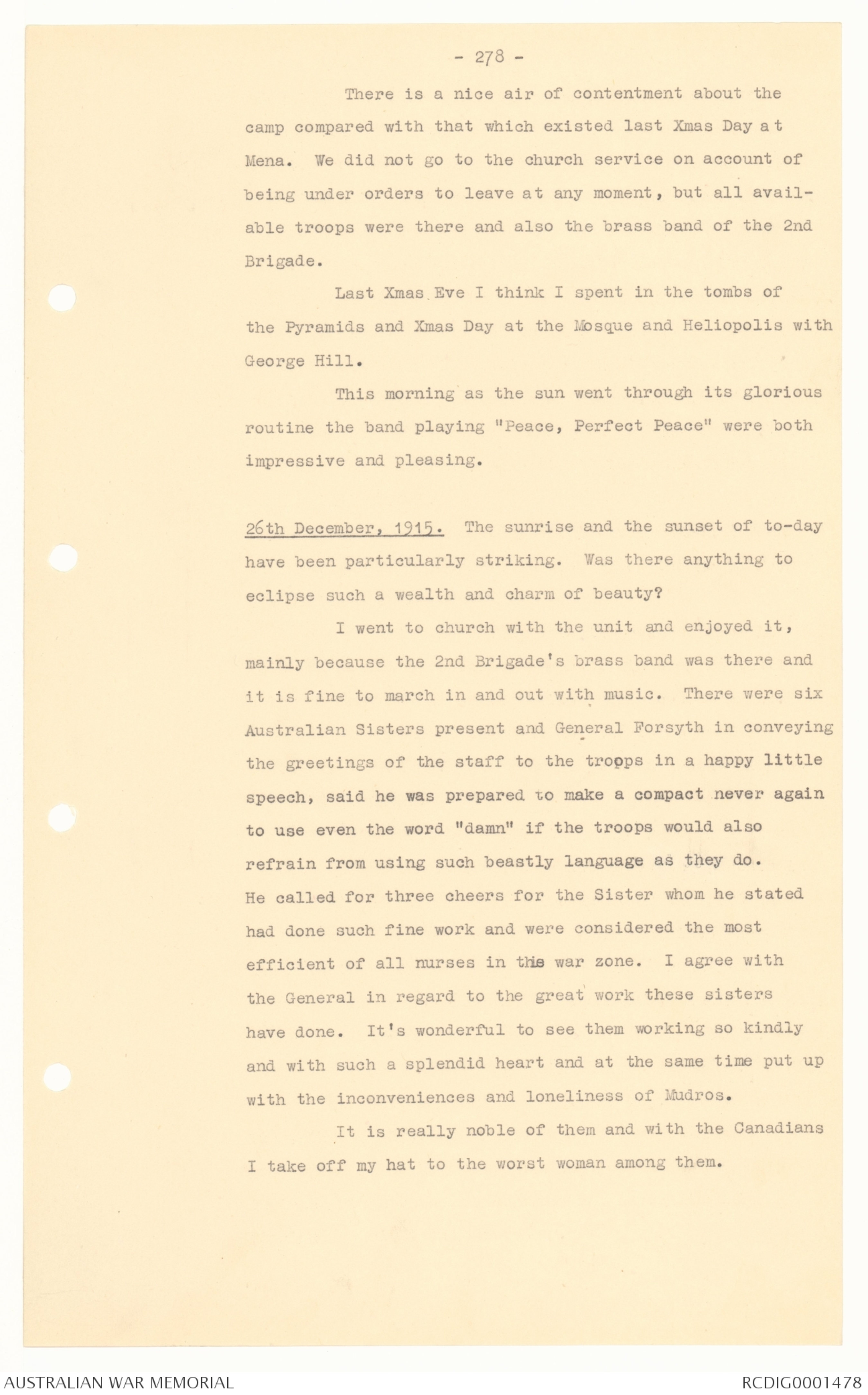
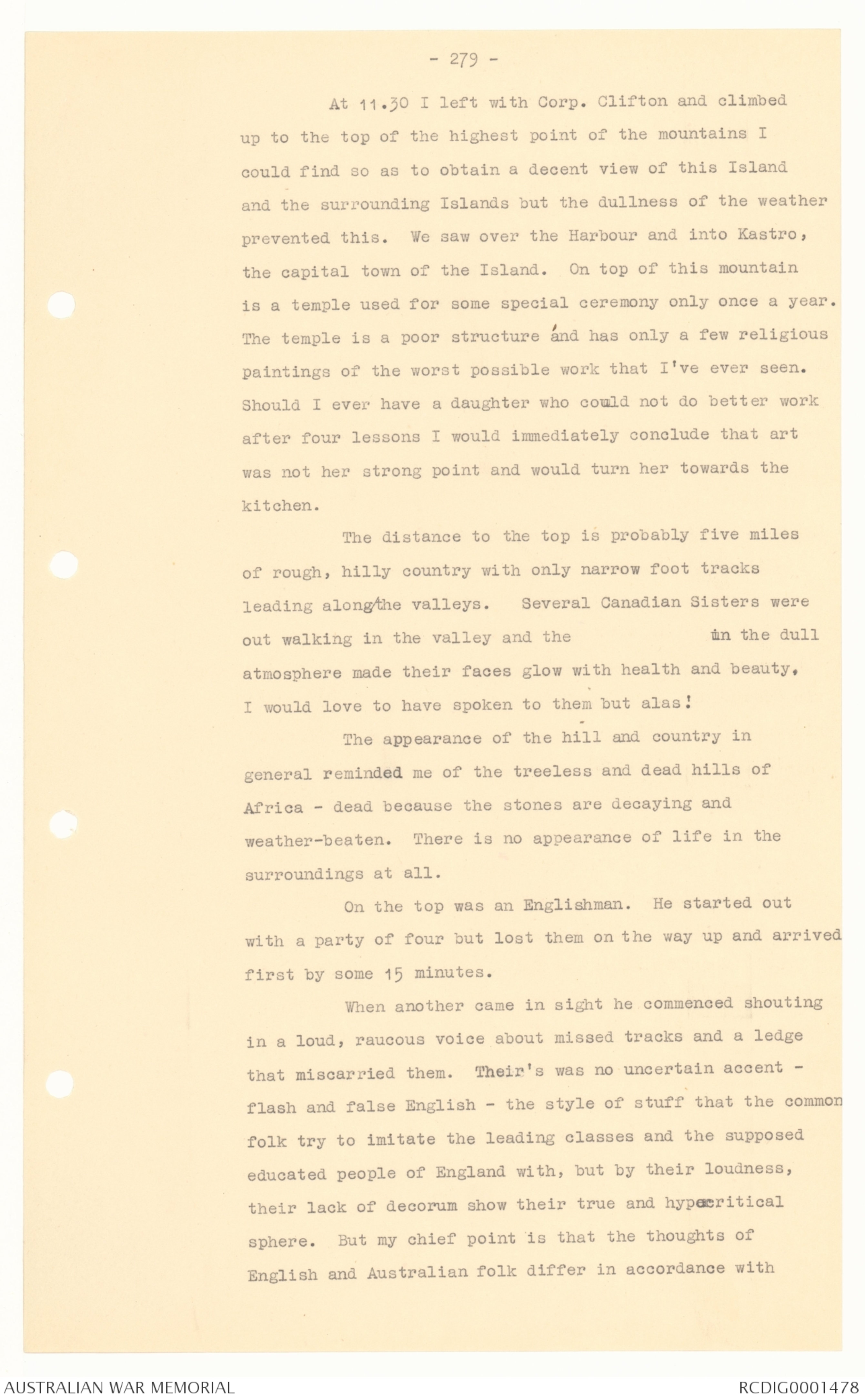
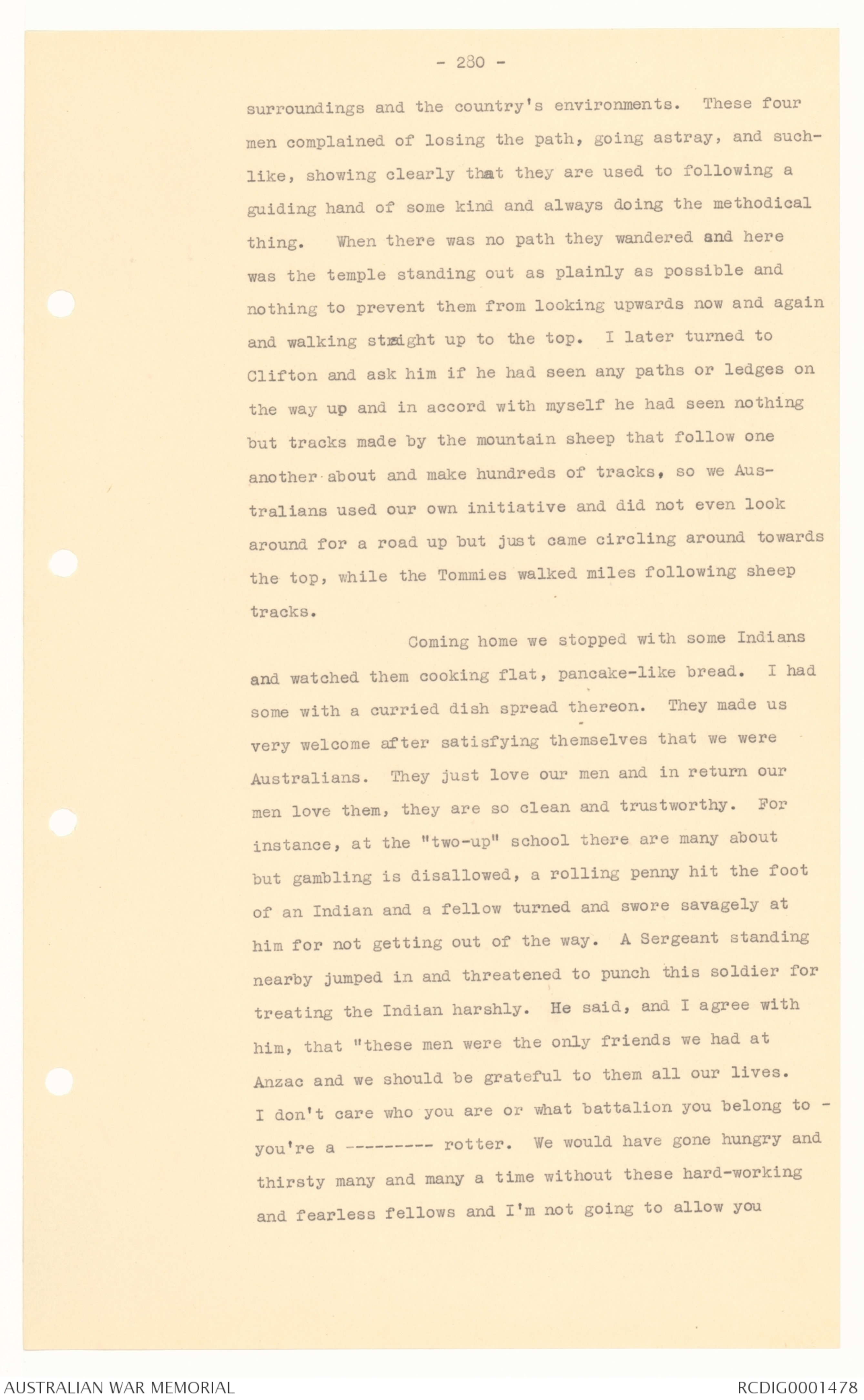
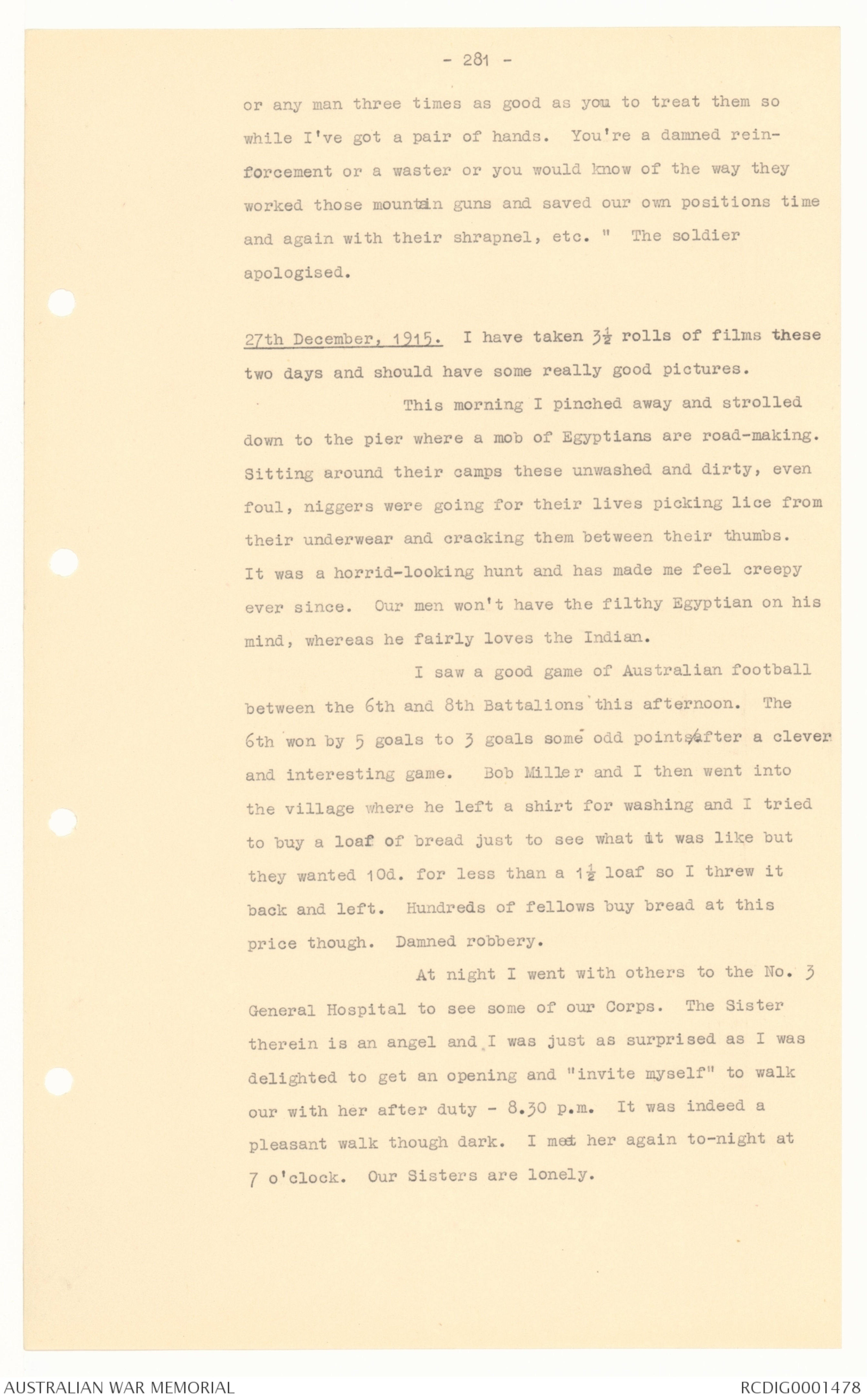
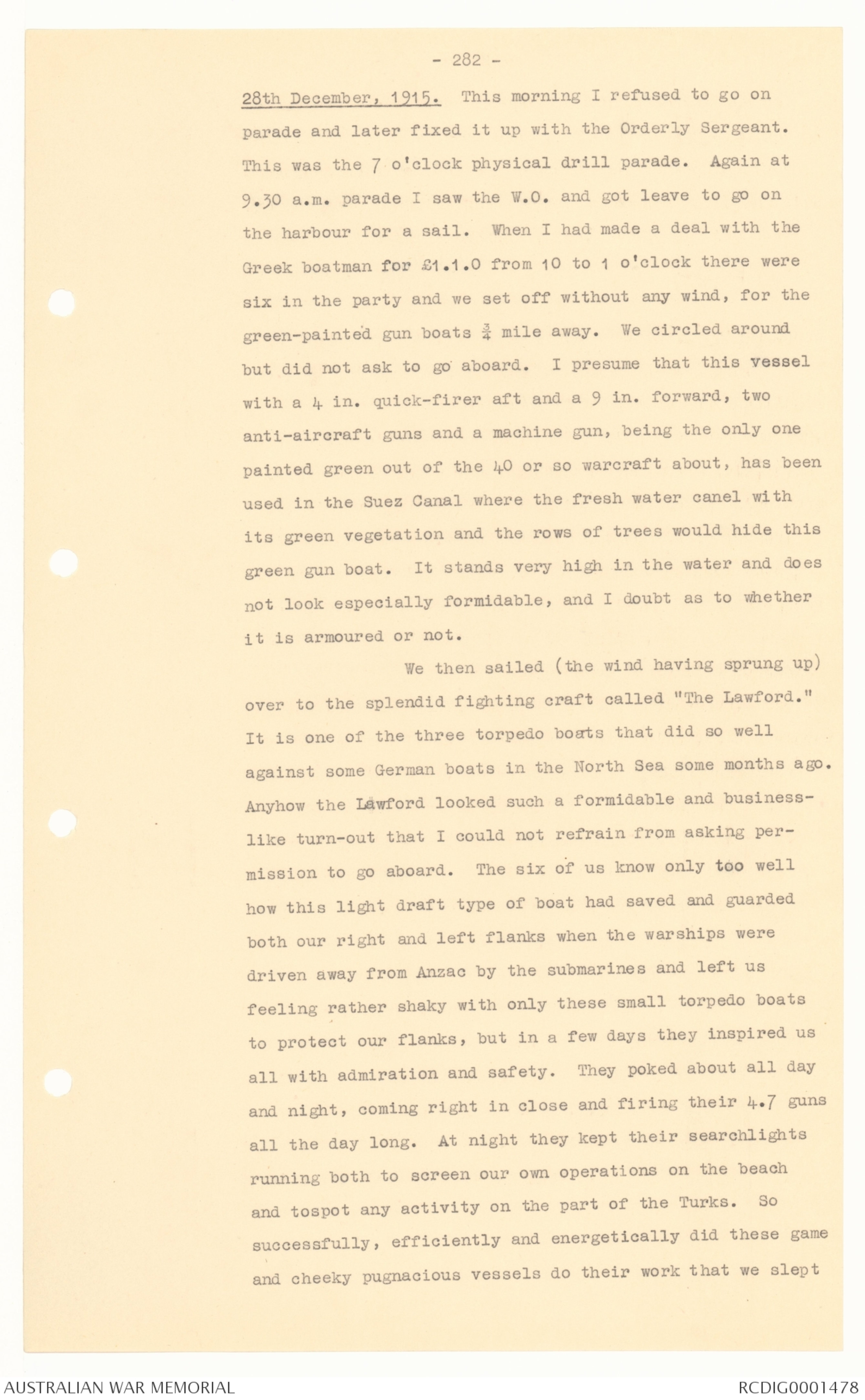
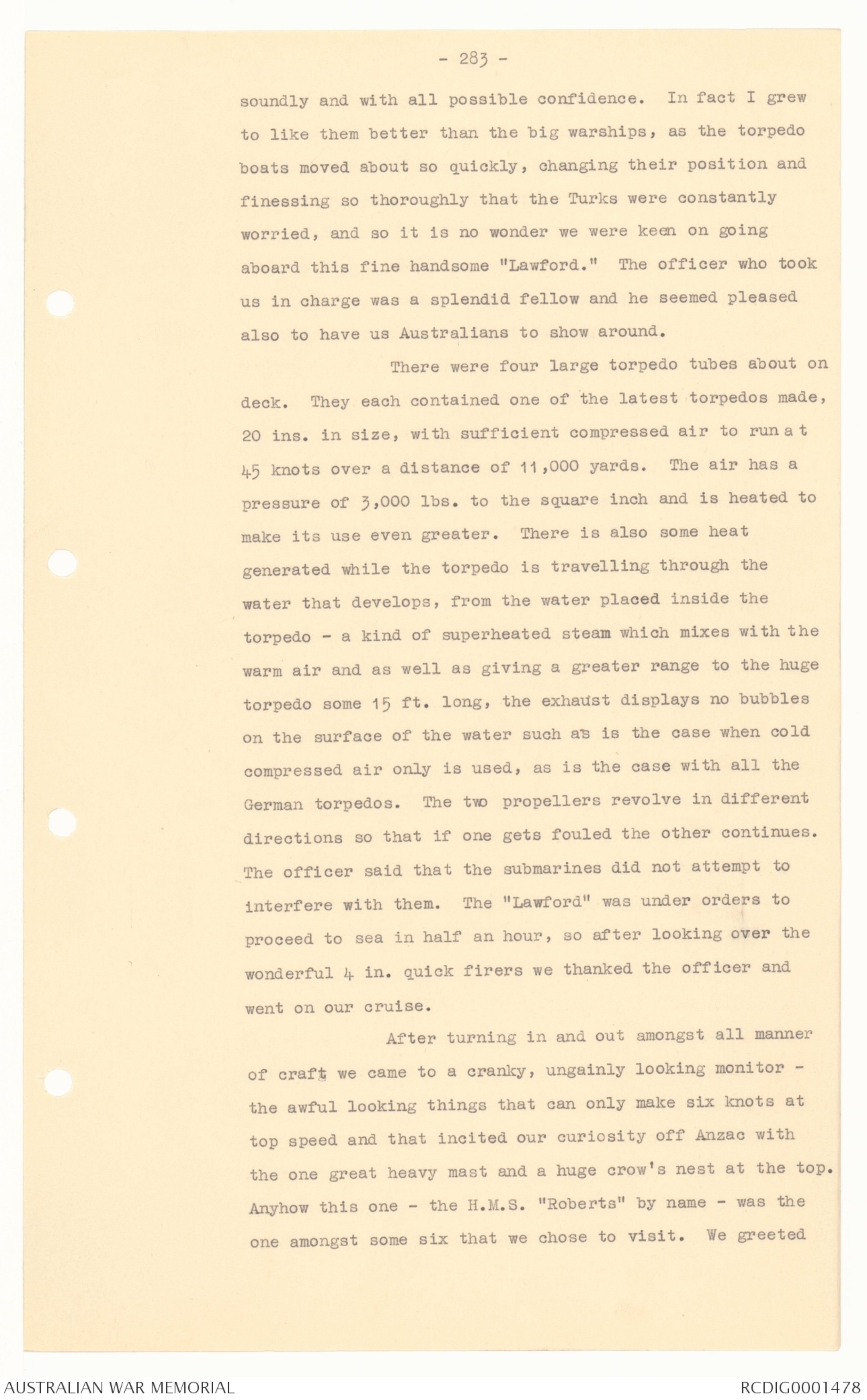
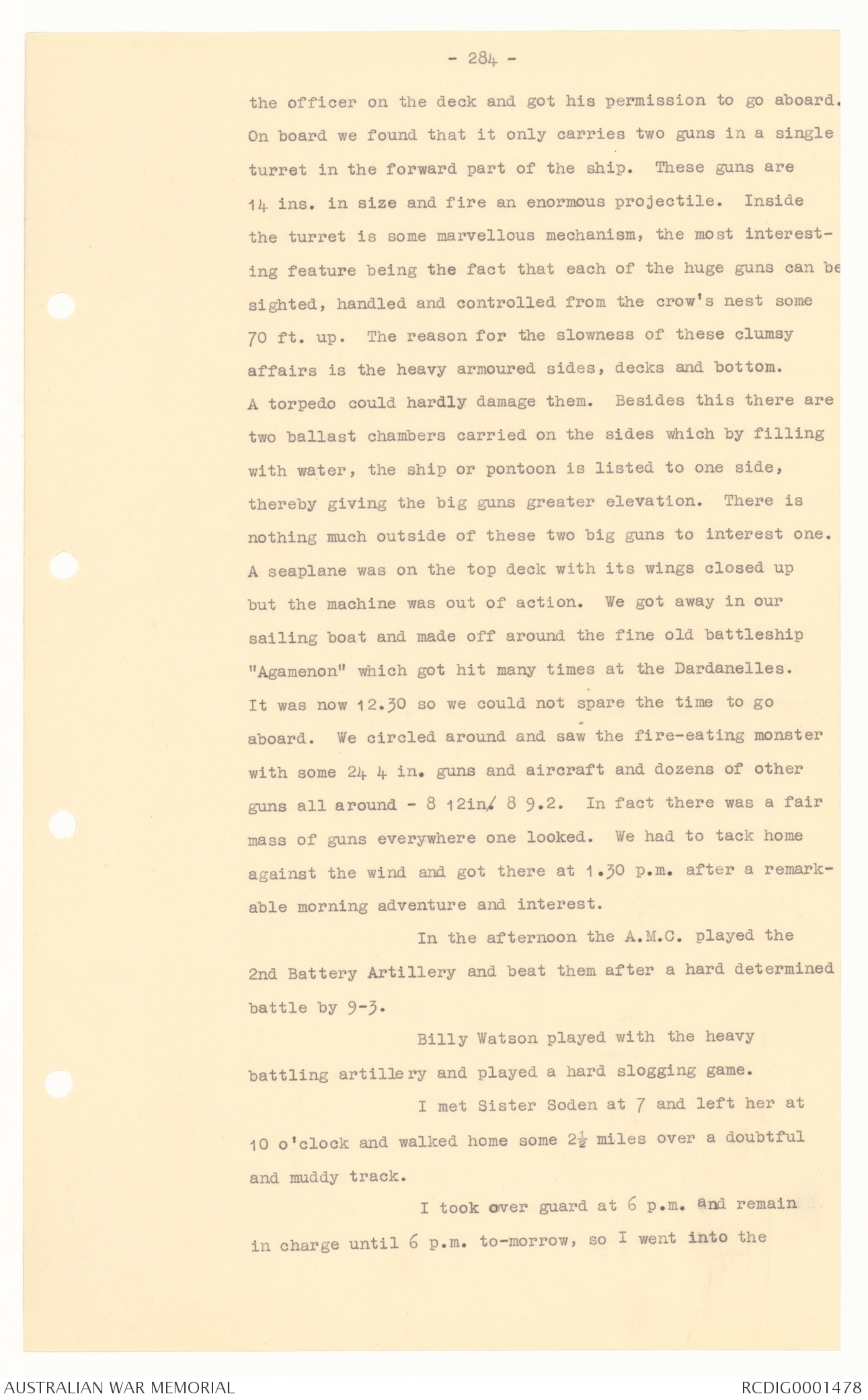
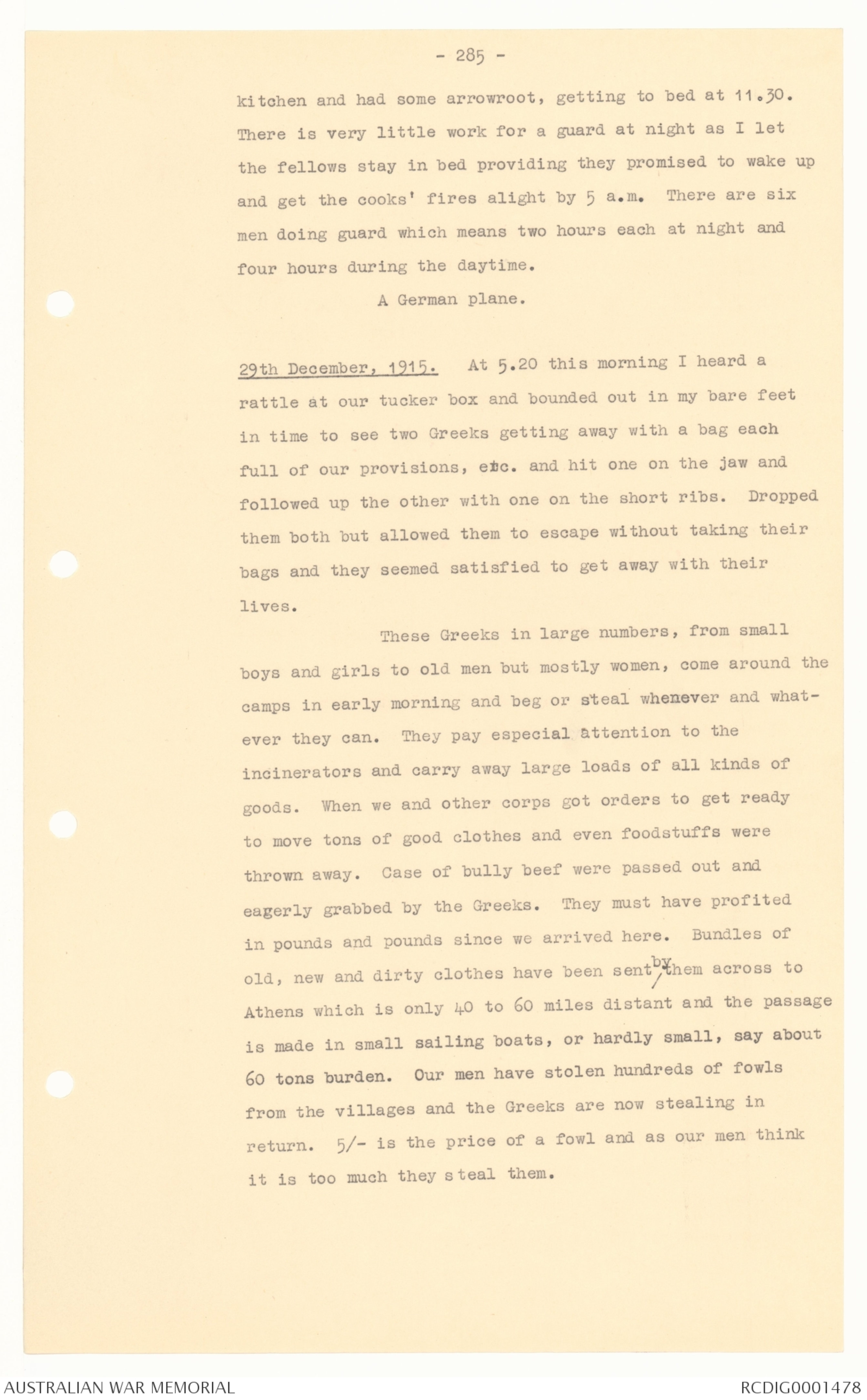
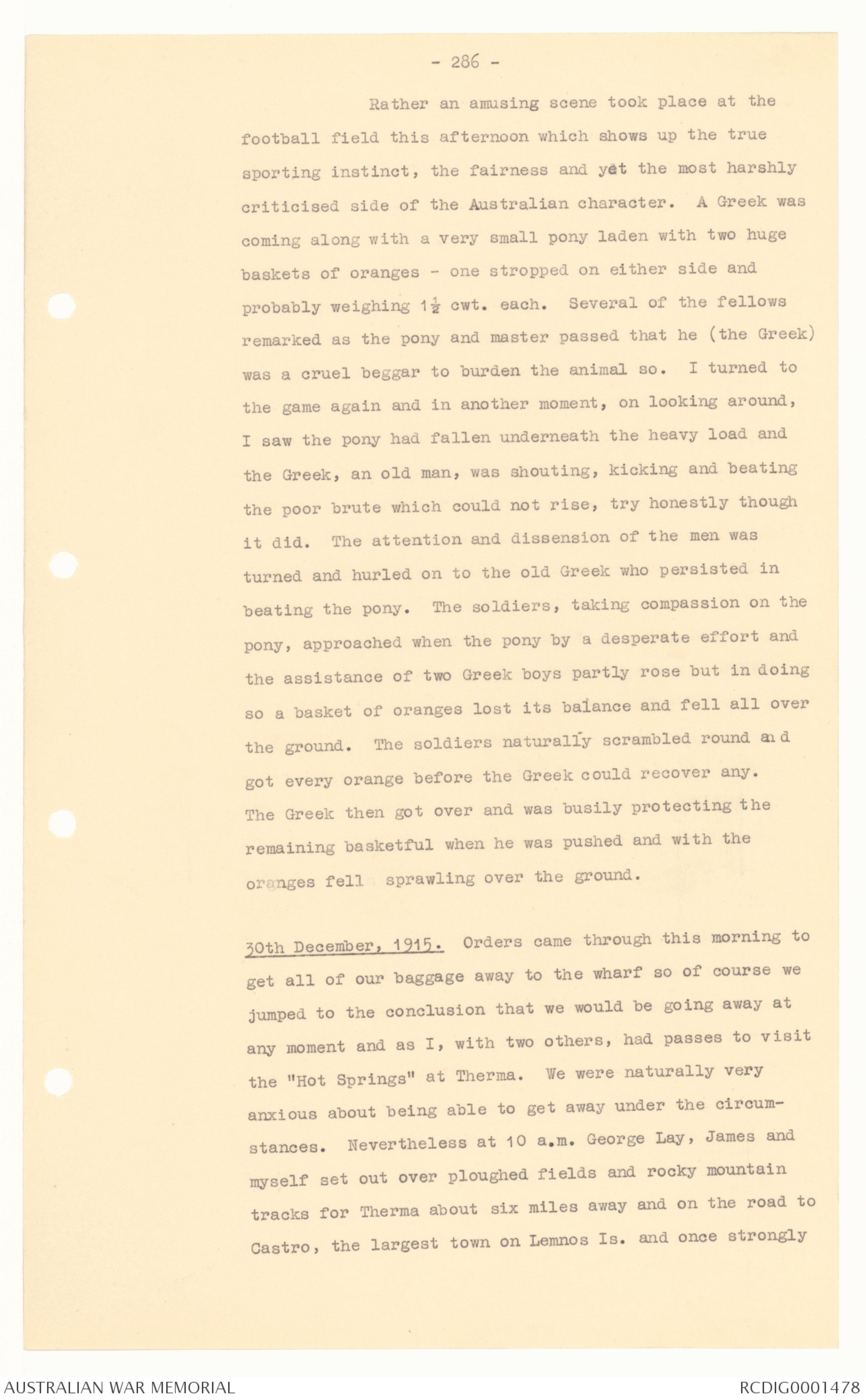
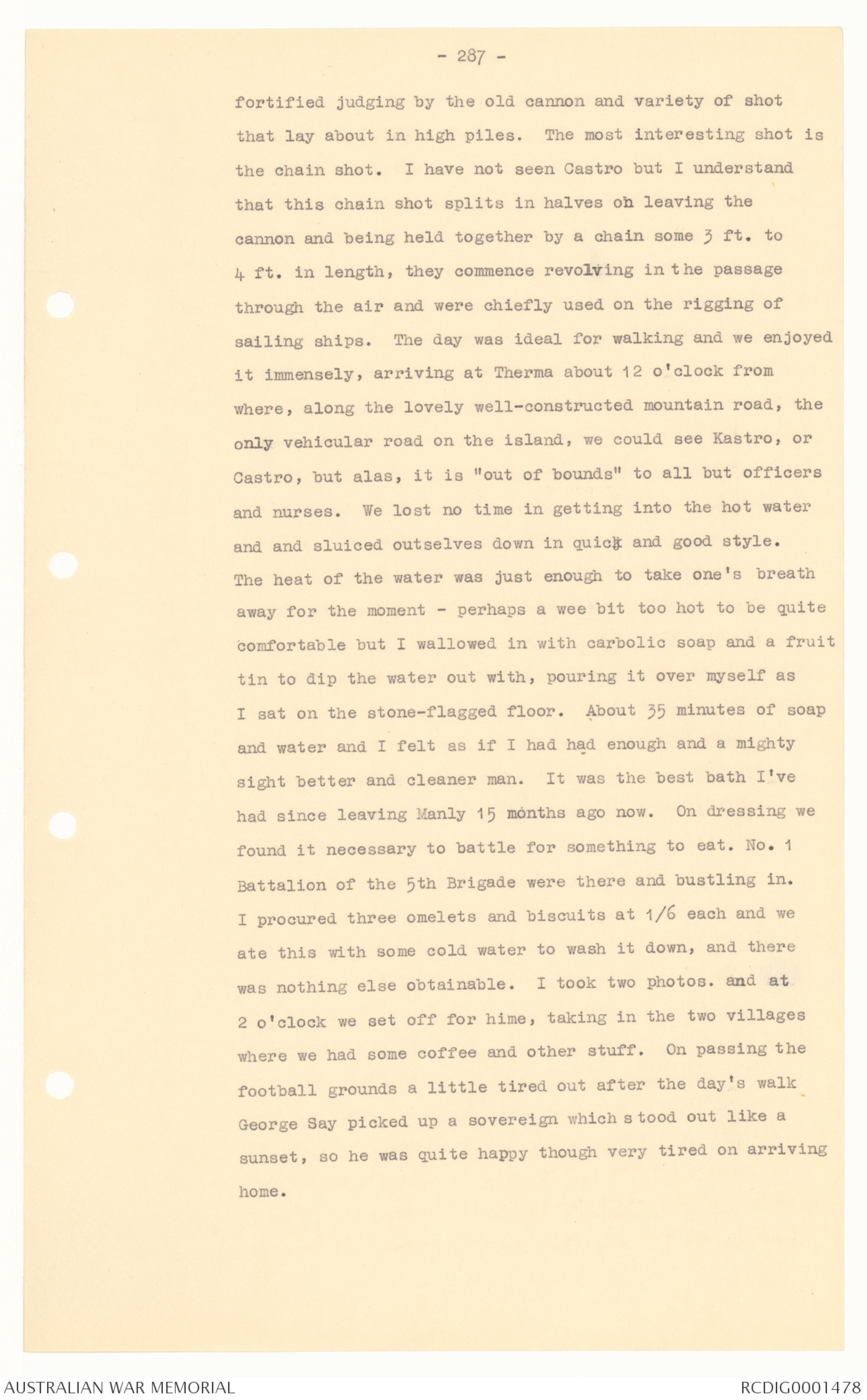
- 278 -
There is a nice air of contentment about the
camp compared with that which existed last Xmas Day at
Mena. We did not go to the church service on account of
being under orders to leave at any moment, but all available
troops were there and also the brass band of the 2nd
Brigade.
Last Xmas Eve I think I spent in the tombs of
the Pyramids and Xmas Day at the Mosque and Heliopolis with
George Hill.
This morning as the sun went through its glorious
routine the band playing "Peace, Perfect Peace" were both
impressive and pleasing.
26th December, 1915. The sunrise and the sunset of to-day
have been particularly striking. Was there anything to
eclipse such a wealth and charm of beauty?
I went to church with the unit and enjoyed it,
mainly because the 2nd Brigade's brass band was there and
it is fine to march in and out with music. There were six
Australian Sisters present and General Forsyth in conveying
the greetings of the staff to the troops in a happy little
speech, said he was prepared to make a compact never again
to use even the word "damn" if the troops would also
refrain from using such beastly language as they do.
He called for three cheers for the Sister whom he stated
had done such fine work and were considered the most
efficient of all nurses in this war zone. I agree with
the General in regard to the great work these sisters
have done. It’s wonderful to see them working so kindly
and with such a splendid heart and at the same time put up
with the inconveniences and loneliness of Mudros.
It is really noble of them and with the Canadians
I take off my hat to the worst woman among them.
- 279 -
At 11.30 I left with Corp. Clifton and climbed
up to the top of the highest point of the mountains I
could find so as to obtain a decent view of this Island
and the surrounding Islands but the dullness of the weather
prevented this. We saw over the Harbour and into Kastro,
the capital town of the Island. On top of this mountain
is a temple used for some special ceremony only once a year.
The temple is a poor structure and has only a few religious
paintings of the worst possible work that I've ever seen.
Should I ever have a daughter who could not do better work
after four lessons I would immediately conclude that art
was not her strong point and would turn her towards the
kitchen.
The distance to the top is probably five miles
of rough, hilly country with only narrow foot tracks
leading along/the valleys. Several Canadian Sisters were
out walking in the valley and the in the dull
atmosphere made their faces glow with health and beauty,
I would love to have spoken to them but alas!
The appearance of the hill and country in
general reminded me of the treeless and dead hills of
Africa - dead because the stones are decaying and
weather-beaten. There is no appearance of life in the
surroundings at all.
On the top was an Englishman. He started out
with a party of four but lost them on the way up and arrived
first by some 15 minutes.
When another came in sight he commenced shouting
in a loud, raucous voice about missed tracks and a ledge
that miscarried them. Their's was no uncertain accent -
flash and false English - the style of stuff that the common
folk try to imitate the leading classes and the supposed
educated people of England with, but by their loudness,
their lack of decorum show their true and hypocritical
sphere. But my chief point is that the thoughts of
English and Australian folk differ in accordance with
- 280 -
surroundings and the country's environments. These four
men complained of losing the path, going astray, and suchlike,
showing clearly that they are used to following a
guiding hand of some kind and always doing the methodical
thing. When there was no path they wandered and here
was the temple standing out as plainly as possible and
nothing to prevent them from looking upwards now and again
and walking straight up to the top. I later turned to
Clifton and ask him if he had seen any paths or ledges on
the way up and in accord with myself he had seen nothing
but tracks made by the mountain sheep that follow one
another about and make hundreds of tracks, so we Australians
used our own initiative and did not even look
around for a road up but just came circling around towards
the top, while the Tommies walked miles following sheep
tracks.
Coming home we stopped with some Indians
and watched them cooking flat, pancake-like bread. I had
some with a curried dish spread thereon. They made us
very welcome after satisfying themselves that we were
Australians. They just love our men and in return our
men love them, they are so clean and trustworthy. For
instance, at the "two-up" school there are many about
but gambling is disallowed, a rolling penny hit the foot
of an Indian and a fellow turned and swore savagely at
him for not getting out of the way. A Sergeant standing
nearby jumped in and threatened to punch this soldier for
treating the Indian harshly. He said, and I agree with
him, that "these men were the only friends we had at
Anzac and we should be grateful to them all our lives.
I don't care who you are or what battalion you belong to -
you're a ------ rotter. We would have gone hungry and
thirsty many and many a time without these hard-working
and fearless fellows and I'm not going to allow you
- 281 -
or any man three times as good as you to treat them so
while I've got a pair of hands. You're a damned reinforcement
or a waster or you would know of the way they
worked those mountain guns and saved our own positions time
and again with their shrapnel, etc. " The soldier
apologised.
27th December, 1915. I have taken 3½ rolls of films these
two days and should have some really good pictures.
This morning I pinched away and strolled
down to the pier where a mob of Egyptians are road-making.
Sitting around their camps these unwashed and dirty, even
foul, niggers were going for their lives picking lice from
their underwear and cracking them between their thumbs.
It was a horrid-looking hunt and has made me feel creepy
ever since. Our men won't have the filthy Egyptian on his
mind, whereas he fairly loves the Indian.
I saw a good game of Australian football
between the 6th and 8th Battalions this afternoon. The
6th won by 5 goals to 3 goals some odd points/after a clever
and interesting game. Bob Miller and I then went into
the village where he left a shirt for washing and I tried
to buy a loaf of bread just to see what it was like but
they wanted 10d. for less than a 1½ loaf so I threw it
back and left. Hundreds of fellows buy bread at this
price though. Damned robbery.
At night I went with others to the No. 3
General Hospital to see some of our Corps. The Sister
therein is an angel and I was just as surprised as I was
delighted to get an opening and "invite myself" to walk
our with her after duty - 8.30 p.m. It was indeed a
pleasant walk though dark. I met her again to-night at
7 o'clock. Our Sisters are lonely.
- 282 -
28th December, 1915. This morning I refused to go on
parade and later fixed it up with the Orderly Sergeant.
This was the 7 o'clock physical drill parade. Again at
9.30 a.m. parade I saw the W.O. and got leave to go on
the harbour for a sail. When I had made a deal with the
Greek boatman for £1.1.0 from 10 to 1 o'clock there were
six in the party and we set off without any wind, for the
green-painted gun boats ¾ mile away. We circled around
but did not ask to go aboard. I presume that this vessel
with a 4 in. quick-firer aft and a 9 in. forward, two
anti-aircraft guns and a machine gun, being the only one
painted green out of the 40 or so warcraft about, has been
used in the Suez Canal where the fresh water canel with
its green vegetation and the rows of trees would hide this
green gun boat. It stands very high in the water and does
not look especially formidable, and I doubt as to whether
it is armoured or not.
We then sailed (the wind having sprung up)
over to the splendid fighting craft called "The Lawford."
It is one of the three torpedo boats that did so well
against some German boats in the North Sea some months ago.
Anyhow the Lawford looked such a formidable and businesslike
turn-out that I could not refrain from asking permission
to go aboard. The six of us know only too well
how this light draft type of boat had saved and guarded
both our right and left flanks when the warships were
driven away from Anzac by the submarines and left us
feeling rather shaky with only these small torpedo boats
to protect our flanks, but in a few days they inspired us
all with admiration and safety. They poked about all day
and night, coming right in close and firing their 4.7 guns
all the day long. At night they kept their searchlights
running both to screen our own operations on the beach
and tospot any activity on the part of the Turks. So
successfully, efficiently and energetically did these game
and cheeky pugnacious vessels do their work that we slept
- 283 -
soundly and with all possible confidence. In fact I grew
to like them better than the big warships, as the torpedo
boats moved about so quickly, changing their position and
finessing so thoroughly that the Turks were constantly
worried, and so it is no wonder we were keen on going
aboard this fine handsome "Lawford." The officer who took
us in charge was a splendid fellow and he seemed pleased
also to have us Australians to show around.
There were four large torpedo tubes about on
deck. They each contained one of the latest torpedos made,
20 ins. in size, with sufficient compressed air to run at
45 knots over a distance of 11,000 yards. The air has a
pressure of 3,000 lbs. to the square inch and is heated to
make its use even greater. There is also some heat
generated while the torpedo is travelling through the
water that develops, from the water placed inside the
torpedo - a kind of superheated steam which mixes with the
warm air and as well as giving a greater range to the huge
torpedo some 15 ft. long, the exhaust displays no bubbles
on the surface of the water such as is the case when cold
compressed air only is used, as is the case with all the
German torpedos. The two propellers revolve in different
directions so that if one gets fouled the other continues.
The officer said that the submarines did not attempt to
interfere with them. The "Lawford" was under orders to
proceed to sea in half an hour, so after looking over the
wonderful 4 in. quick firers we thanked the officer and
went on our cruise.
After turning in and out amongst all manner
of craft we came to a cranky, ungainly looking monitor -
the awful looking things that can only make six knots at
top speed and that incited our curiosity off Anzac with
the one great heavy mast and a huge crow's nest at the top.
Anyhow this one - the H.M.S. "Roberts" by name - was the
one amongst some six that we chose to visit. We greeted
- 284 -
the officer on the deck and got his permission to go aboard.
On board we found that it only carries two guns in a single
turret in the forward part of the ship. These guns are
14 ins. in size and fire an enormous projectile. Inside
the turret is some marvellous mechanism, the most interesting
feature being the fact that each of the huge guns can be
sighted, handled and controlled from the crow's nest some
70 ft. up. The reason for the slowness of these clumsy
affairs is the heavy armoured sides, decks and bottom.
A torpedo could hardly damage them. Besides this there are
two ballast chambers carried on the sides which by filling
with water, the ship or pontoon is listed to one side,
thereby giving the big guns greater elevation. There is
nothing much outside of these two big guns to interest one.
A seaplane was on the top deck with its wings closed up
but the machine was out of action. We got away in our
sailing boat and made off around the fine old battleship
"Agamenon" which got hit many times at the Dardanelles.
It was now 12.30 so we could not spare the time to go
aboard. We circled around and saw the fire-eating monster
with some 24 4 in. guns and aircraft and dozens of other
guns all around - 8 12in/. 8 9.2. In fact there was a fair
mass of guns everywhere one looked. We had to tack home
against the wind and got there at 1.30 p.m. after a remarkable
morning adventure and interest.
In the afternoon the A.M.C. played the
2nd Battery Artillery and beat them after a hard determined
battle by 9-3.
Billy Watson played with the heavy
battling artillery and played a hard slogging game.
I met Sister Soden at 7 and left her at
10 o'clock and walked home some 2½ miles over a doubtful
and muddy track.
I took over guard at 6 p.m. and remain
in charge until 6 p.m. to-morrow, so I went into the
- 285-
kitchen and had some arrowroot, getting to bed at 11.30.
There is very little work for a guard at night as I let
the fellows stay in bed providing they promised to wake up
and get the cooks' fires alight by 5 a.m. There are six
men doing guard which means two hours each at night and
four hours during the daytime.
A German plane.
29th December, 1915. At 5.20 this morning I heard a
rattle at our tucker box and bounded out in my bare feet
in time to see two Greeks getting away with a bag each
full of our provisions, etc. and hit one on the jaw and
followed up the other with one on the short ribs. Dropped
them both but allowed them to escape without taking their
bags and they seemed satisfied to get away with their
lives.
These Greeks in large numbers, from small
boys and girls to old men but mostly women, come around the
camps in early morning and beg or steal whenever and whatever
they can. They pay especial attention to the
incinerators and carry away large loads of all kinds of
goods. When we and other corps got orders to get ready
to move tons of good clothes and even foodstuffs were
thrown away. Case of bully beef were passed out and
eagerly grabbed by the Greeks. They must have profited
in pounds and pounds since we arrived here. Bundles of
old, new and dirty clothes have been sent ∧ by them across to
Athens which is only 40 to 60 miles distant and the passage
is made in small sailing boats, or hardly small, say about
60 tons burden. Our men have stolen hundreds of fowls
from the villages and the Greeks are now stealing in
return. 5/- is the price of a fowl and as our men think
it is too much they steal them.
- 286 -
Rather an amusing scene took place at the
football field this afternoon which shows up the true
sporting instinct, the fairness and yet the most harshly
criticised side of the Australian character. A Greek was
coming along with a very small pony laden with two huge
baskets of oranges - one stropped on either side and
probably weighing 1½ cwt. each. Several of the fellows
remarked as the pony and master passed that he (the Greek)
was a cruel beggar to burden the animal so. I turned to
the game again and in another moment, on looking around,
I saw the pony had fallen underneath the heavy load and
the Greek, an old man, was shouting, kicking and beating
the poor brute which could not rise, try honestly though
it did. The attention and dissension of the men was
turned and hurled on to the old Greek who persisted in
beating the pony. The soldiers, taking compassion on the
pony, approached when the pony by a desperate effort and
the assistance of two Greek boys partly rose but in doing
so a basket of oranges lost its balance and fell all over
the ground. The soldiers naturally scrambled round and
got every orange before the Greek could recover any.
The Greek then got over and was busily protecting the
remaining basketful when he was pushed and with the
oranges fell sprawling over the ground.
30th December, 1915. Orders came through this morning to
get all of our baggage away to the wharf so of course we
jumped to the conclusion that we would be going away at
any moment and as I, with two others, had passes to visit
the "Hot Springs" at Therma. We were naturally very
anxious about being able to get away under the circumstances.
Nevertheless at 10 a.m. George Lay, James and
myself set out over ploughed fields and rocky mountain
tracks for Therma about six miles away and on the road to
Castro, the largest town on Lemnos Is. and once strongly
- 287 -
fortified judging by the old cannon and variety of shot
that lay about in high piles. The most interesting shot is
the chain shot. I have not seen Castro but I understand
that this chain shot splits in halves on leaving the
cannon and being held together by a chain some 3 ft. to
4 ft. in length, they commence revolving in the passage
through the air and were chiefly used on the rigging of
sailing ships. The day was ideal for walking and we enjoyed
it immensely, arriving at Therma about 12 o'clock from
where, along the lovely well-constructed mountain road, the
only vehicular road on the island, we could see Kastro, or
Castro, but alas, it is "out of bounds" to all but officers
and nurses. We lost no time in getting into the hot water
and and sluiced outselves down in quick and good style.
The heat of the water was just enough to take one's breath
away for the moment - perhaps a wee bit too hot to be quite
comfortable but I wallowed in with carbolic soap and a fruit
tin to dip the water out with, pouring it over myself as
I sat on the stone-flagged floor. About 35 minutes of soap
and water and I felt as if I had had enough and a mighty
sight better and cleaner man. It was the best bath I've
had since leaving Manly 15 months ago now. On dressing we
found it necessary to battle for something to eat. No.1
Battalion of the 5th Brigade were there and bustling in.
I procured three omelets and biscuits at 1/6 each and we
ate this with some cold water to wash it down, and there
was nothing else obtainable. I took two photos, and at
2 o'clock we set off for hime, taking in the two villages
where we had some coffee and other stuff. On passing the
football grounds a little tired out after the day's walk
George Say picked up a sovereign which s tood out like a
sunset, so he was quite happy though very tired on arriving
home.
 Transcriber 27983
Transcriber 27983This transcription item is now locked to you for editing. To release the lock either Save your changes or Cancel.
This lock will be automatically released after 60 minutes of inactivity.